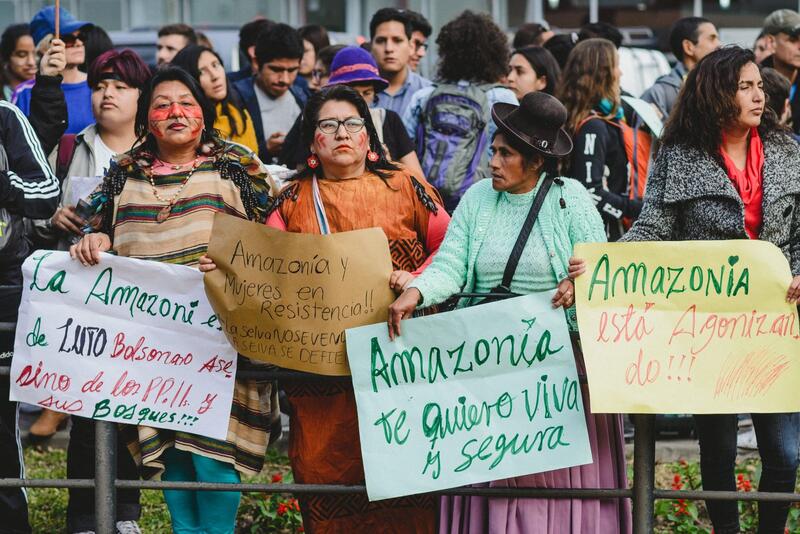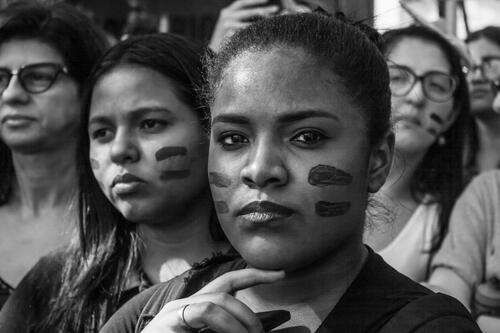
This is our second installment featuring current Indigenous environmental issues for Indigenous People’s Day. Go here for last week's feature on the Wet’suwet’en peoples and their fight against the Coastal GasLink pipeline.
Since taking office in early 2019, Brazil’s President Jair Bolsonaro's policies have caused widespread destruction to both the natural environment of Brazil and the Indigenous peoples who live there. There has been much criticism on the international scene of his reckless environmental policies, but this global scrutiny has not slowed his efforts. He denies much of the climate change science and has previously threatened to pull out of the Paris accord.
His attempts to open up the Amazon even further to ranchers, miners, and profiteers has devastated both the land and the peoples living there. He blamed the recent rash of fires last month in the rainforest and Pantanal wetlands—the worst in 10 years—on the Indigenous peoples there, instead of admitting what scientists have known for quite some time, that they are caused and exacerbated by the kind of clear-cutting and deforestation that he has been actively encouraging. He blamed the 2019 fires on NGOs. Through legislation, he is attempting to make these violations on protected Indigenous land legal. The bill he introduced earlier this year would allow mining, hydroelectric, gas, and oil companies to strip the natural resources from Indigenous lands. He also plans to introduce nuclear power plants to these areas, as well. He has already discontinued the steep fines for environmental violations and radically decreased government inspections, giving those seeking to pillage the natural resources of the Amazon a de facto open door. He has made it very clear that profit and economic growth come before all else, stating “Where there is Indigenous land, there is wealth underneath it.”
As if the rape of their land was not injury enough, the Indigenous people of Brazil are literally fighting for their lives. They have lost much of the medical care they were receiving, after Bolsonaro made threats to the Cuban medical professionals who were tending to them. He has made his disdain for the Indigenous abundantly clear throughout his career, stating in the late 1990s that it was a “shame that the Brazilian cavalry hadn’t been as efficient as the American one, which exterminated the Indians,” and recently, “The Indigenous person can’t remain in his land as if he were some prehistoric creature.” Federal aid for the Indigenous has dried up, while CoVid19 has hit them very hard. At least 30,000 have been infected and it has killed many tribal elders. Yet the government has spent less this year on medical services for the Indigenous than in previous years. In addition, for many years Indigenous children in more populous areas of the country have been taken by the government due to poverty and claims of neglect, while the government is significantly contributing to keeping them in poverty and from being able to give proper medical care to their children. This is seen by many as a ploy to keep the next generation from connecting with their ancestral culture and traditions, as many of these children are kept in facilities, away from their families, for years.
Yet, astonishingly, his popularity ratings within Brazil are higher than ever. His promises of economic growth and abundance still seem to have great hold over the Brazilian citizens, which has only been increased by the aid payments approximately 51% of the population have been receiving during the pandemic. This “Trump of the Tropics,” as he has been called (he and Trump are mutually supportive of each others’ policies), is up for re-election in 2022.
There are many organizations trying to help stem the tide of environmental destruction and violations of human rights in the Brazilian Amazon. To learn more and to find out how you can help the Awa, Guarani, Kawahiva, and Yanomami peoples of Brazil, go to Survival International and select a tribe from the menu beneath the map. There is also abundant information on how you can help on the Amigos daTerra Brasil (Friends of the Earth Brazil) site, but please note that this site is completely in Spanish.

